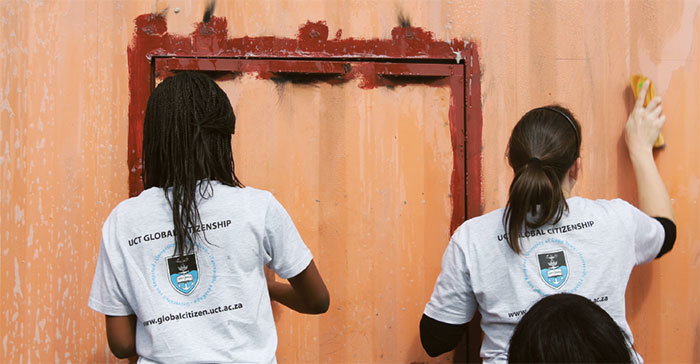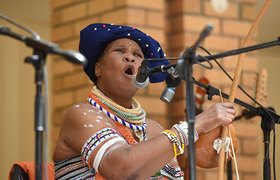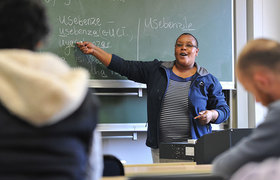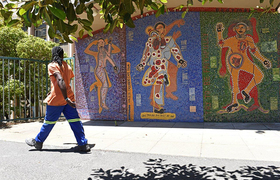Global Citizenship Programme: Compassionate, ethical, engaged
27 July 2015
Can our university system evolve to teach students about the world they face in the 21st century? Can it teach them how to be compassionate, ethical and engaged citizens in an increasingly interconnected and complex world?
These questions are at the heart of UCT's Global Citizenship Programme, now in its sixth year and aimed at creating civic-minded 'modern intellectuals' through a "different knowledge project".
These are graduates who are socially engaged and concerned with social injustice and who think and debate differently about local and global issues.
Funded by the vice-chancellor and the DG Murray Trust, the Global Citizenship Programme is a free, non-credit course for all students.
The programme's mainstays are three interlinked but separate extra-curricular short courses: Global Debates, Local Voices (GC1); Service, Citizenship and Social Justice (GC2); and voluntary community service, 60 hours of self-organised community service followed by structured reflection (GC3).
Teach students about 'being' in the world
Each is designed to teach students three key things: knowledge beyond their degree or discipline; skills such as leadership and critical thinking, active listening, and argument and debating skills; and values such as social justice.
"Universities need to move beyond the 'mantra' of knowledge and skills – knowing and doing – and equip students for 'being' in the world in new ways," said Dr Janice McMillan, a senior lecturer in the Centre for Innovation in Learning and Teaching, and convenor of the Global Citizenship Programme.
Global citizenship is an essential part of what McMillan refers to as "cultivating humanity": teaching students to critically examine their own traditions and beliefs, recognise their community and fellowship with human beings around the world – and consider what it's like to walk in someone else's shoes.
While it draws from the academic disciplines, it is knowledge as an "enablement of 'being' in different ways".
"All the work on these courses gives students a slightly more complicated lens with which to engage the world. It helps them make sense of their knowledge and how they enact it."
While few could argue the merits of this kind of 'depth' learning, it's been an uphill battle for the team, because it's potentially disruptive of mainstream learning. "It asks different questions," said McMillan.
Adding breadth to depth
Their challenge is how to bring relevant aspects of the programme to bear on the formal curriculum in a more sustainable way. In an already crowded curriculum that must also address poor student preparedness for university, it's a tough ask.
One way has been to align the programme more closely to the university's four strategic initiatives: Safety and Violence; African Climate and Development; Schools Improvement; and Poverty and Inequality.
All four themes are evident in the GC1 short course (global debates, local voices) but also serve to frame aspects of the GC2 short course (service, citizenship and social justice). In both GC2 and GC3, students critically refl ect on their community service in the context of poverty, inequality and social justice.
"Initiatives like these provide core contexts through which students can engage with key issues in service work and service organisations," said McMillan. In its six years the programme has developed crucial partnerships with the faculties, each of which has taken up the programme in different ways.
One coup is the credit-bearing course on social infrastructures introduced in the Faculty of Engineering & the Built Environment, and held during the June/July winter term. The course has grown from 60 to 100 places.
"It helps students locate their emerging engineering knowledge within a much bigger societal context," said McMillan. It's this context that's so valuable to learning.
In the commerce faculty, the GCP has been very popular with fi rst-year students, starting in O-Week when students debate some complicated issues on poverty, education, gender inequality and climate change, all global citizenship themes.
In addition, each of the core commerce courses (evidence-based management, information systems (IS), economics and maths) offers a GC lecture as part of their fi rst-year programme. And the IS honours community service component requires their students to complete the GC1 and GC2 modules.
In the law faculty they're working with colleagues to link up with the faculty's community service block, to help students think about community service in specifi c ways.
In the health sciences faculty the team has been offered potential space in the MBChB curriculum for research projects, elective models and co-teaching.
"These students are already learning in the community as part of their practice learning. The faculty is keen to do things in a more transformative way by introducing global citizenship-thinking to their curriculum."
With its very full curriculum and student throughput demands, the science faculty is a challenge. There's little space to introduce the breadth the Global Citizenship Programme brings to academic programmes. But it's also essential to get science students to think differently about the application of their knowledge in the real world, says McMillan, who is working with the faculty to make this possible.
Beyond academic departments
Outide the academic departments, the GCP team has forged links with departments such as student affairs, careers services, student residences and SHAWCO.
Taking this a step further, the programme has piloted the GC-Act project this year, providing an opportunity for students to development activation campaigns on campus. For this, the GCP has made contact with four activist-oriented student organisations on campus: Amnesty International (themes of war and peace); Equal Education (public schooling); InkuluFreeHeid (equality and democracy); and the Green Campus Initiative (climate change/sustainability).
As the programme gathers traction, other opportunities arise. McMillan is particularly excited by a new venture with the Global Network for Young Europeans (GLEN).
They have submitted a funding proposal for an international collaboration on the practice and understanding of global citizen education to bring youth to various global sites in several partner countries in both Europe and Africa.
The GCP has asked to be a partner in the initial phase over the next 18 months.
Though it's been a battle to embed the thinking around global citizenship into the formal academic offerings, McMillan believes the time has come to take the programme to another level across the curriculum, "so that the GCP can contribute to the debate at UCT about what it means to be an African university".
"Hopefully, we've begun to lay the foundations for this over the past five years."
Story by Helen Swingler
 This work is licensed under a Creative Commons Attribution-NoDerivatives 4.0 International License.
This work is licensed under a Creative Commons Attribution-NoDerivatives 4.0 International License.
Please view the republishing articles page for more information.










